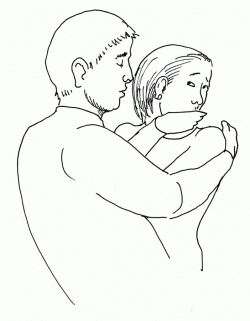Kiss off: Philomatophobia = no puckering up
Q. What's "philematophobia," in "Philadelphia" (the "city of brotherly love") or anywhere for that matter? –T. Hanks
A. It's the "fear of kissing," or feeling squeamish about puckering up, says Sheril Kirshenbaum in The Science of Kissing. This occurs when people become terrified of lip-on-lip contact, some frightened of bacteria, others of having their tongue bitten off. Most of us, though, want to keep on kissing in spite of the risks; cleanliness can help defeat the germs and also boost the likelihood that any other mouth pressed to yours will be back for more.
"In reality, there are generally a greater number of dangerous germs transmitted during a handshake than a kiss," says Kirshenbaum.
Q. How long can a bird stay aloft? –A. Hale
A. It depends on the species, says ScienceIllustrated.Com magazine. Ostriches can't fly at all, but buzzards and albatrosses can soar for hours or days. The bar-tailed godwit, which migrates between New Zealand and Alaska, is known for the longest nonstop flight of eight days and 7,000 miles. Ornithologist Robert Gill believes it’s probably the longest nonstop transoceanic journey of any animal on Earth.
"The shape of a bird's wings and body, the ratio of wingspan to weight, plus the amount of fat carried and metabolic rate,” Gill says, “all contribute to the huge variability in bird endurance."
Q. At what point would a line from Cleveland down through the Earth's center emerge? –J. Brown
A. Such locations are known as "antipodes," or direct opposites, says University of Saskatchewan geographer Scott Bell. The word is Greek for "having feet opposite," or people and places diametrically opposed on the globe. The most distant point on Earth from you right now is the antipode. Thus the antipodes are separated by half the circumference of the globe (180 degrees), with one point being as far north of the equator as the other is south. Midnight at one point is noonday at the other.
Computing the antipode point can be tricky, involving latitude and longitude readings, maps, globes, calculations. But in this Internet age, just log on to antipodr.com and type in a street address or city name, and the antipode will be calculated for you.
The geographic coordinates of downtown Cleveland are latitude N 41 degrees 30 seconds, longitude W 81 degrees 42 seconds, says University of Nebraska geographer John Bauer. Its antipode would be latitude S 41 degrees 30 seconds, longitude E 98 degrees 42 seconds, "located in the Southern Ocean, approximately 1,000 miles southwest of Perth, Australia."
Q. What special conversational skill is required for a phone call that you don't need when e-mailing, texting, instant messaging or Twittering? –S. Garcia
A. It helps to be able to interpret voice intonations, pauses, pacings, but that's necessary for face-to-face conversations as well, says Sherry Turkle in Alone Together. So look elsewhere to understand why e-mail and texting have become the preferred way of communicating information.
Turkle mentions the case of Audrey, a high-schooler who is never without her cell phone, sometimes using it to text even as she instant-messages at an open computer screen. Audrey prefers texting to talking. When texting, she feels at a reassuring distance, in control of the conversation even if it goes in an unwanted direction. She can just say, "Got to go, bye."
This last is what Audrey (and apparently millions of others) likes least about talking on the phone. "A phone call," she explains, "requires the skill to end a conversation when you have no real reason to leave... You just want to. I don't know how to do it. I don’t want to learn."
~
Send Strange questions to brothers Bill and Rich at [email protected]
